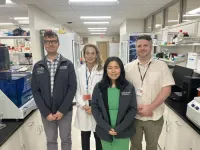(Press-News.org) Fussy eating is mainly influenced by genes and is a stable trait lasting from toddlerhood to early adolescence, finds a new study led by researchers from UCL (University College London), King’s College London and the University of Leeds.
The study, published in the Journal of Child Psychology & Psychiatry and funded by the UK mental health charity MQ Mental Health Research, compared survey results of parents with identical or non-identical twins in England and Wales from the ages of 16 months to 13 years.
The research team found that average levels of food fussiness were relatively stable during this period, peaking somewhat around the age of seven and declining slightly after that.
They concluded that genetic differences in the population accounted for 60% of the variation in food fussiness at 16 months, rising to 74% and over between the ages of three and 13.
Environmental factors shared between twins, such as the types of foods that are eaten at home, were found to be significant only in toddlerhood, while environmental factors unique to each twin (i.e., not shared by co-twins), such as individual personal experiences (e.g., having different friends), became more influential in later years.
Food fussiness describes the tendency to eat a small range of foods, due to selectivity about textures or tastes, or reluctance to try new foods.
Lead author Dr Zeynep Nas (UCL Behavioural Science & Health) said: “Food fussiness is common among children and can be a major source of anxiety for parents and caregivers, who often blame themselves for this behaviour or are blamed by others.
“We hope our finding that fussy eating is largely innate may help to alleviate parental blame. This behaviour is not a result of parenting.
“Our study also shows that fussy eating is not necessarily just a ‘phase’, but may follow a persistent trajectory.”
Senior author Professor Clare Llewellyn (UCL Behavioural Science & Health) said: “While genetic factors are the predominant influence for food fussiness, environment also plays a supporting role.
“Shared environmental factors, such as sitting down together as a family to eat meals, may only be significant in toddlerhood. This suggests that interventions to help children eat a wider range of foods, such as repeatedly exposing children to the same foods regularly and offering a variety of fruits and vegetables, may be most effective in the very early years.”
The research team analysed data from the UCL-led Gemini study, the largest twin cohort ever set up to study genetic and environmental contributions to early growth, which involves 2,400 sets of twins.
Parents filled in questionnaires about their children’s eating behaviours when the children were 16 months, three, five, seven and 13 years old.
To disentangle genetic from environmental influences, the researchers compared the similarity in fussy eating between non-identical twin pairs, who share 50% of their genes, with the similarity between identical twin pairs, who share 100% of their genes.
They found that non-identical twin pairs were much less similar in their fussy eating than identical twin pairs, indicating a large genetic influence.
The team also found that identical twin pairs became more different to each other in their fussy eating as they got older, indicating an increase in the role of unique environmental factors at older ages. (Any differences between identical twin pairs are down to unique environmental factors, as identical twin pairs share both their genes and certain aspects of their environment that make them more similar to each other.)
Unique environmental factors accounted for about a quarter of individual differences between children in fussy eating by ages seven and 13, the researchers estimated.
Shared environmental factors, meanwhile, accounted for a quarter of individual differences between children in food fussiness at 16 months, with a negligible effect in later years.
Senior author Dr Alison Fildes (University of Leeds) said: “Although fussy eating has a strong genetic component and can extend beyond early childhood, this doesn’t mean it is fixed. Parents can continue to support their children to eat a wide variety of foods throughout childhood and into adolescence, but peers and friends might become a more important influence on children’s diets as they reach their teens.”
Among the study limitations, the researchers noted that there were fewer participants at age seven (703 children) compared to other time points and that the study sample had a large proportion of white British households of higher socio-economic backgrounds compared to the general population of England and Wales.
In future, the team said, research should focus on non-western populations where food culture, parental feeding practices and food security may be quite different.
The study involved researchers at UCL Behavioural Science & Health, the University of Leeds, King’s College London, South London and Maudsley NHS Foundation Trust, and the University of Cambridge.
END
Food fussiness a largely genetic trait from toddlerhood to adolescence
Fussy eating is mainly influenced by genes and is a stable trait lasting from toddlerhood to early adolescence, finds a new study led by researchers from UCL, King’s College London and the University of Leeds
2024-09-19
ELSE PRESS RELEASES FROM THIS DATE:
Celebrating a century of scholarship: Isis examines the HSS at 100
2024-09-19
Isis: A Journal of the History of Science Society is widely recognized as a leading voice in the history of science. George Sarton founded the journal in 1912, and two years later the History of Science Society (HSS) was formed to advance the journal’s mission and centralize the nascent discipline. The September 2024 issue of Isis pays tribute to the centennial anniversary of the HSS with a collection of articles that delve into the rich history of the society and its publications.
In their introduction to the issue, editors Alexandra Hui and Matthew Lavine write that the issue can be seen as “a love letter of sorts: to the Isis readership, ...
Key biomarkers identified for predicting disability progression in multiple sclerosis
2024-09-19
A pioneering study presented today at ECTRIMS 2024 has identified critical biomarkers that can predict disability worsening in multiple sclerosis (MS). The breakthrough research has the potential to transform treatment strategies for millions of MS patients worldwide, paving the way for more personalised and effective treatment plans.1
In this multicentre observational study, conducted across 13 hospitals in Spain and Italy, Dr. Enric Monreal and his team found that elevated serum neurofilament light chain (sNfL) levels—a protein indicating nerve cell damage—at the onset of MS can predict both relapse-associated worsening (RAW) and progression independent ...
Study: AI could lead to inconsistent outcomes in home surveillance
2024-09-19
CAMBRIDGE, MA — A new study from researchers at MIT and Penn State University reveals that if large language models were to be used in home surveillance, they could recommend calling the police even when surveillance videos show no criminal activity.
In addition, the models the researchers studied were inconsistent in which videos they flagged for police intervention. For instance, a model might flag one video that shows a vehicle break-in but not flag another video that shows a similar activity. Models often disagreed with one another over whether to call the police ...
Study: Networks of Beliefs theory integrates internal & external dynamics
2024-09-19
The beliefs we hold develop from a complex dance between our internal and external lives. Our personal-level cognition and our relationships with others work in concert to shape our views of the world and influence how likely we are to update those views when we encounter new information. In the past, these two levels of belief have been studied largely in isolation: psychologists have modeled the individual-level cognitive processes while researchers in fields from computational social science to statistical physics have offered insights ...
Vegans’ intake of protein and essential amino acids is adequate but ultra-processed products are also needed
2024-09-19
In an article published in JAMA Network Open, researchers at the University of São Paulo’s Medical School (FM-USP) report on a study involving 774 men and women who followed a vegan diet in Brazil.
Their findings show that on average the participants consumed the recommended amount of proteins and essential amino acids, and that their diet consisted largely of unprocessed and minimally processed foods. However, participants who consumed proportionally lower levels of industrialized products such as protein supplements and textured soy protein were more likely to exhibit inadequate ...
Major $21 million Australian philanthropic investment to bring future science into disease diagnosis
2024-09-19
An outstanding $21 million philanthropic investment will establish a pioneering research centre to advance precision diagnosis for diseases that affect millions of Australians.
The Colonial Foundation Diagnostics Centre will use cutting-edge ‘spatial biology’ technologies to deliver enhanced diagnosis and, in turn, personalised care for patients with inflammatory diseases, like rheumatoid arthritis and inflammatory bowel disease.
The centre, co-led by WEHI and the Royal Melbourne Hospital, and funded by the Colonial Foundation, builds on an existing partnership that has pioneered potential new tests for detecting early-stage dementia.
At a glance
A $21 million ...
Innovating alloy production: A single step from ores to sustainable metals
2024-09-19
Metal production is responsible for 10% of global CO2 emissions, with iron production emitting two tons of CO2 for every ton of metal produced, and nickel production emitting 14 tons of CO2 per ton and even more, depending on the ore used. These metals form the foundation of alloys that have a low thermal expansion, called Invar. They are critical for the aerospace, cryogenic transport, energy and precision instrument sectors. Recognizing the environmental toll, scientists at the Max Planck Institute for Sustainable Materials (MPI-SusMat) have now developed a new method to produce Invar alloys without emitting ...
New combination treatment brings hope to patients with advanced bladder cancer
2024-09-19
Findings from the international FORT-2 clinical trial showed that a combination treatment including immunotherapy is safe and tolerable in patients with locally advanced or metastatic bladder cancer. The results, which were recently published in JAMA Oncology, show potential to broaden the number of patients with bladder cancer who could benefit from immunotherapy, an approach that harnesses a patient's own immune system to fight cancer.
“The major problem with immunotherapy was it works great for some patients with ...
Grants for $3.5M from TARCC fund new Alzheimer’s disease research at UTHealth Houston
2024-09-19
Studies by researchers at UTHealth Houston seeking to understand the underlying pathology of Alzheimer’s disease in order to discover new pathways to treatment have earned multiple awards totaling $3.5 million from the Texas Alzheimer’s Research and Care Consortium (TARCC).
A state-funded organization composed of 11 medical schools across the state, the goal of the TARCC is to fund Alzheimer’s-related projects within the member institutions and promote collaborative efforts. Rodrigo Morales, PhD, professor of neurology with McGovern Medical ...
UTIA researchers win grant for automation technology for nursery industry
2024-09-19
University of Tennessee Extension and UT AgResearch scientists have been awarded part of a nearly $10 million grant from the U.S. Department of Agriculture to study ways to use automation and robotics to address the labor shortage in the nursery crops industry.
Growing plants in a nursery is highly dependent on manual labor, making this industry particularly prone to worker shortages. An increasingly scarce workforce is limiting production, economic development and prosperity in the rural communicates where nurseries ...
LAST 30 PRESS RELEASES:
ASU researchers to lead AAAS panel on water insecurity in the United States
ASU professor Anne Stone to present at AAAS Conference in Phoenix on ancient origins of modern disease
Proposals for exploring viruses and skin as the next experimental quantum frontiers share US$30,000 science award
ASU researchers showcase scalable tech solutions for older adults living alone with cognitive decline at AAAS 2026
Scientists identify smooth regional trends in fruit fly survival strategies
Antipathy toward snakes? Your parents likely talked you into that at an early age
Sylvester Cancer Tip Sheet for Feb. 2026
Online exposure to medical misinformation concentrated among older adults
Telehealth improves access to genetic services for adult survivors of childhood cancers
Outdated mortality benchmarks risk missing early signs of famine and delay recognizing mass starvation
Newly discovered bacterium converts carbon dioxide into chemicals using electricity
Flipping and reversing mini-proteins could improve disease treatment
Scientists reveal major hidden source of atmospheric nitrogen pollution in fragile lake basin
Biochar emerges as a powerful tool for soil carbon neutrality and climate mitigation
Tiny cell messengers show big promise for safer protein and gene delivery
AMS releases statement regarding the decision to rescind EPA’s 2009 Endangerment Finding
Parents’ alcohol and drug use influences their children’s consumption, research shows
Modular assembly of chiral nitrogen-bridged rings achieved by palladium-catalyzed diastereoselective and enantioselective cascade cyclization reactions
Promoting civic engagement
AMS Science Preview: Hurricane slowdown, school snow days
Deforestation in the Amazon raises the surface temperature by 3 °C during the dry season
Model more accurately maps the impact of frost on corn crops
How did humans develop sharp vision? Lab-grown retinas show likely answer
Sour grapes? Taste, experience of sour foods depends on individual consumer
At AAAS, professor Krystal Tsosie argues the future of science must be Indigenous-led
From the lab to the living room: Decoding Parkinson’s patients movements in the real world
Research advances in porous materials, as highlighted in the 2025 Nobel Prize in Chemistry
Sally C. Morton, executive vice president of ASU Knowledge Enterprise, presents a bold and practical framework for moving research from discovery to real-world impact
Biochemical parameters in patients with diabetic nephropathy versus individuals with diabetes alone, non-diabetic nephropathy, and healthy controls
Muscular strength and mortality in women ages 63 to 99
[Press-News.org] Food fussiness a largely genetic trait from toddlerhood to adolescenceFussy eating is mainly influenced by genes and is a stable trait lasting from toddlerhood to early adolescence, finds a new study led by researchers from UCL, King’s College London and the University of Leeds




